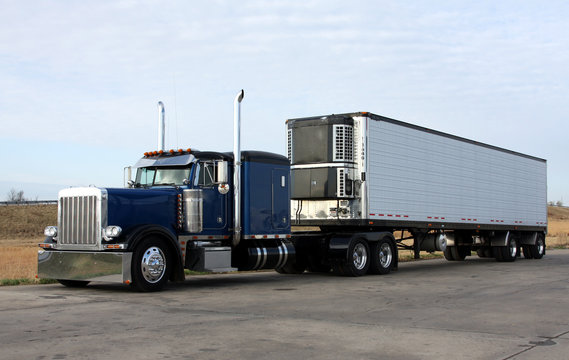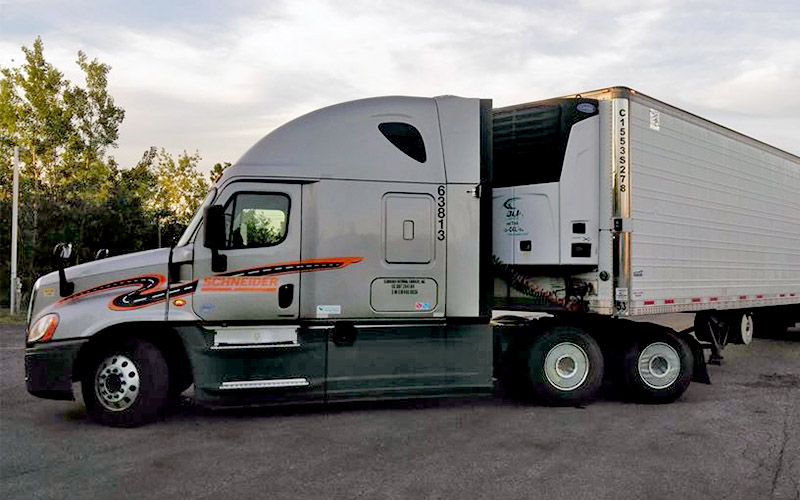Reefer Trucks Thermo King: Trusted for Temperature-Sensitive Product
Leading Developments in Transport Refrigeration: Enhancing Effectiveness and Safety
The landscape of transport refrigeration is undergoing significant makeover, driven by advancements aimed at enhancing both performance and security. Key advancements such as smart temperature level tracking systems, environmentally friendly refrigerants, and automated path optimization are pivotal in addressing the market's challenges. These modern technologies not only guarantee the integrity of temperature-sensitive products yet also add to sustainability initiatives. As these advancements continue to progress, it is vital to explore their ramifications on operational techniques and regulatory conformity, prompting a better assessment of exactly how they improve the future of transport refrigeration.
Smart Temperature Keeping An Eye On Equipments
In the realm of transportation refrigeration, smart temperature tracking systems have actually become an essential development for making certain the honesty of temperature-sensitive goods. These advanced systems utilize Internet of Things (IoT) innovation to supply real-time information on temperature level fluctuations, enabling drivers to maintain ideal conditions throughout the supply chain. By constantly tracking the temperature of refrigerated containers and cars, business can promptly identify deviations that may compromise item top quality.

Moreover, clever surveillance systems commonly integrate automated alerts and notices, allowing stakeholders to react promptly to any prospective issues. This positive method not only minimizes the risk of wasting yet additionally enhances conformity with governing requirements controling food safety and pharmaceutical transport.
The assimilation of information analytics within these systems additionally helps with anticipating upkeep, helping operators to visualize potential equipment failures prior to they take place. This capacity decreases downtime and optimizes functional efficiency, inevitably resulting in cost financial savings.
Eco-Friendly Refrigerants
Smart temperature level monitoring systems play an essential duty in maintaining item high quality, yet the effectiveness of transport refrigeration likewise pivots on the selection of refrigerants utilized. In comparison, arising choices like hydrocarbon-based cooling agents and hydrofluoroolefins (HFOs) present lower GWP choices, using both performance and sustainability.
These environmentally friendly refrigerants not just minimize environmental impact but also align with global policies focused on terminating hazardous substances. Their adoption can lead to enhanced energy efficiency, ultimately decreasing operating expense for transport refrigeration systems. The usage of natural refrigerants, such as ammonia and carbon dioxide, has actually obtained grip due to their outstanding thermodynamic residential or commercial properties and lower ecological impact.
Buying environmentally friendly cooling agents is not just a governing compliance measure; it stands for a calculated decision that enhances brand name online reputation and promotes customer commitment. refrigerated transportation thermo king. By focusing on lasting practices, companies can contribute to a greener future while ensuring the stability of moved items
Advanced Insulation Products
Utilizing advanced insulation materials is critical for maximizing transportation refrigeration systems, as they substantially improve power effectiveness and maintain constant temperature level control. Typical insulation techniques frequently drop short in avoiding thermal transfer, resulting in raised energy usage and fluctuating temperature levels within cooled compartments.
Arising products such as vacuum protected panels (VIPs) and aerogels offer remarkable thermal resistance, enabling for thinner accounts without compromising performance. VIPs, as an example, utilize a vacuum cleaner layer to minimize convective and conductive warmth transfer, making them optimal for space-constrained applications. Aerogels, recognized for their permeable and light-weight structure, supply extraordinary helpful resources insulation while dramatically decreasing general system weight.
Additionally, including phase modification materials (PCMs) into insulation systems can better stabilize temperatures during transit. These products absorb and release thermal power, properly buffering against outside temperature variants.
The combination of these innovative insulation products not only reduces the operational costs related to energy consumption but likewise expands the rack life of temperature-sensitive goods. As the transportation refrigeration industry remains to progress, the fostering of ingenious insulation innovations will certainly be critical in improving both effectiveness and safety and security in cooled transport.
Automated Path Optimization
The effectiveness of transportation refrigeration systems is significantly boosted through automated path optimization, which leverages real-time data and innovative formulas to determine the most effective courses for distribution. By evaluating different factors such as web traffic patterns, climate condition, and distribution windows, these systems can substantially minimize travel time and fuel intake.
Automated course optimization minimizes human mistake and subjective decision-making, which can cause ineffectiveness. This innovation enables fleet managers to allocate sources better, guaranteeing that chilled products preserve their needed temperature level throughout the trip. By optimizing paths, companies can additionally improve customer contentment with prompt distributions.
Additionally, automated systems can adapt to unanticipated situations, such as roadway closures or unexpected traffic spikes, enabling dynamic rerouting. This adaptability not only secures the integrity of temperature-sensitive items however additionally adds to total operational performance.
Implementing automated course optimization can result in considerable cost financial savings while reducing the carbon impact connected with transport. As companies progressively prioritize sustainability, this advancement sticks out as an essential part in modern transport refrigeration, aligning functional objectives with environmental obligation. visit this website Inevitably, automated course optimization represents a substantial development in the mission for performance and safety and security in transport refrigeration.

Real-Time Information Analytics
Automated path optimization considerably take advantage of the combination of real-time data analytics, which gives essential understandings into the performance of transportation refrigeration systems. By making use of real-time information, transportation operators can monitor temperature level changes and equipment efficiency, making sure that disposable items are preserved within needed specifications throughout transportation. This proactive technique not just improves the quality of the moved items but additionally reduces the threat of perishing and loss.

Along with enhancing performance, real-time analytics boosts safety and security by guaranteeing compliance with regulatory standards for temperature control. This not just secures public health and wellness but also fortifies a firm's track record - thermo king transport refrigeration. As the transportation refrigeration market evolves, the assimilation of real-time information analytics becomes a keystone for driving technology, sustainability, and functional excellence
Conclusion
In conclusion, the advancements in transportation refrigeration substantially enhance both performance and safety within the industry. Smart temperature level monitoring systems and real-time information analytics offer crucial oversight, while green refrigerants and progressed insulation materials add to sustainability and energy effectiveness. Automated path optimization formulas not only decrease traveling time but likewise decrease environmental influence. Collectively, these developments stand for a vital advancement in transport refrigeration, making sure conformity with governing requirements and promoting a greener future.
The landscape of transport refrigeration is undergoing considerable change, driven by advancements aimed at enhancing both effectiveness and security.Smart temperature level tracking systems play an important duty in Read Full Article preserving product top quality, however the effectiveness of transportation refrigeration additionally hinges on the option of cooling agents made use of. Their fostering can lead to enhanced power effectiveness, ultimately minimizing operating prices for transport refrigeration systems. Eventually, automated course optimization represents a significant innovation in the quest for efficiency and safety and security in transport refrigeration.
In verdict, the innovations in transportation refrigeration significantly improve both effectiveness and security within the market.